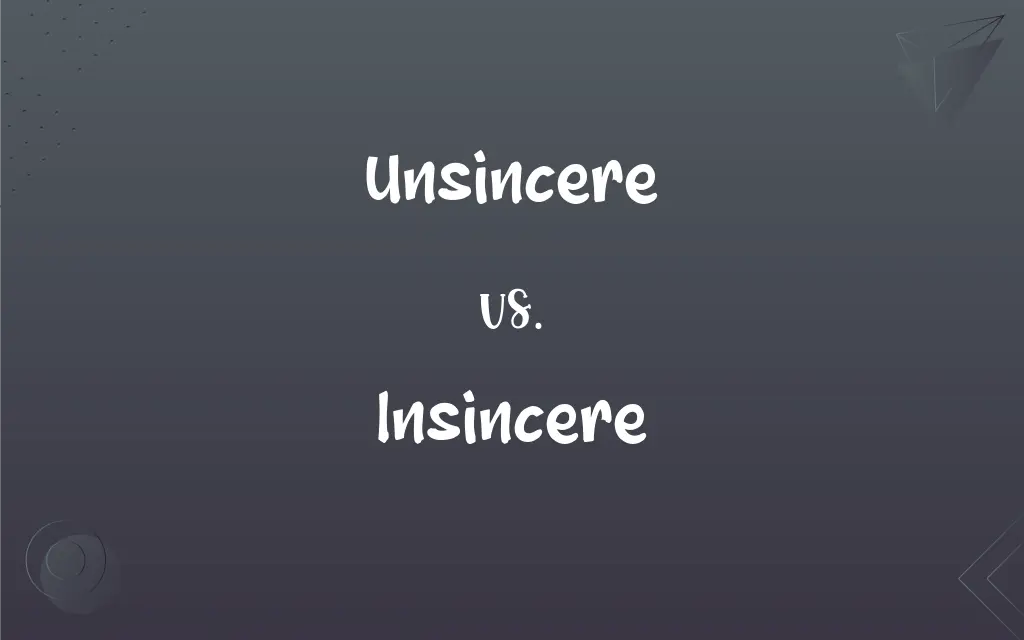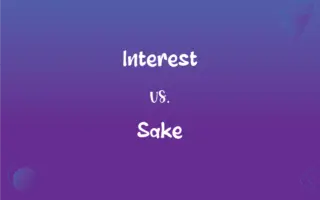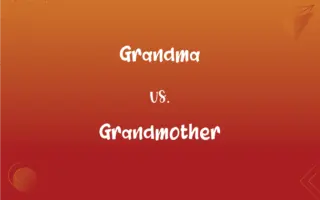Unsincere vs. Insincere: What's the Difference?
By Aimie Carlson & Janet White || Updated on May 21, 2024
Unsincere refers to lacking sincerity or genuine feelings, while insincere specifically denotes deceitfulness or false display of feelings.

Key Differences
Unsincere refers to the absence of sincerity or genuine emotion. It implies a general lack of heartfelt feeling or honesty in expression. For example, someone might give an unsincere compliment that feels half-hearted or unconvincing. Insincere, on the other hand, denotes a more deliberate falseness. When someone is insincere, they are intentionally being deceitful or pretending to have feelings they do not possess. An insincere apology, for instance, is one given without any real remorse or intention to make amends.
Unsincere actions often come across as indifferent or lacking depth. This can happen unintentionally, where the person might not fully realize their lack of genuine emotion. In contrast, insincere actions are consciously deceptive, aiming to mislead or manipulate others.
The usage of unsincere is less common in English, and it often overlaps with insincere in meaning. However, insincere is the more widely accepted and used term, especially when referring to purposeful deceit or hypocrisy.
While unsincere might be used to describe someone’s lack of genuine interest or engagement, insincere typically involves a calculated effort to feign emotions or intentions for personal gain or to deceive.
Comparison Chart
Definition
Lacking sincerity or genuine feeling
Deliberately deceitful or false
ADVERTISEMENT
Common Usage
Less common
More common
Intent
Often unintentional
Deliberate
Connotation
Indifferent, lack of depth
Deceptive, hypocritical
Example
An unsincere compliment
An insincere apology
Unsincere and Insincere Definitions
Unsincere
Lacking authenticity.
The speech felt unsincere, more like an obligation.
ADVERTISEMENT
Insincere
Deliberately false.
His insincere apology only made things worse.
Unsincere
Not heartfelt.
Her unsincere congratulations didn't fool anyone.
Insincere
Feigned.
She offered insincere sympathy, not truly caring.
Unsincere
Not earnest.
His unsincere attempts to help were evident to all.
Insincere
Deceptive.
She gave an insincere compliment, hoping to gain favor.
Unsincere
Lacking genuine emotion.
His smile was unsincere, without any real warmth.
Insincere
Hypocritical.
His insincere concern was obvious to everyone.
Unsincere
Half-hearted.
The applause was unsincere and quickly died down.
Insincere
Pretending to have feelings.
The politician’s insincere promises were evident.
Unsincere
Insincere
Insincere
Not sincere; not genuine
An insincere apology.
Unsincere
Not sincere or pure; insincere.
Insincere
Habitually phony or dishonest
Distrusted him as insincere.
Insincere
Not genuinely meaning what has been expressed; not sincere; artificial.
Janice's furious glare showed that her apology was insincere.
Insincere
Not being in truth what one appears to be; not sincere; dissembling; hypocritical; disingenuous; deceitful; false; - said of persons; also of speech, thought; etc.; as, insincere declarations.
Insincere
Disappointing; imperfect; unsound.
To render sleep's soft blessings insincere.
Insincere
Lacking sincerity;
A charming but thoroughly insincere woman
Their praise was extravagant and insincere
FAQs
What does unsincere mean?
Unsincere means lacking sincerity or genuine feeling.
What does insincere mean?
Insincere means being deceitful or showing false feelings.
Can unsincere and insincere be used interchangeably?
Sometimes, but insincere is more commonly used for deliberate deceit.
Does unsincere imply intent?
Often, it does not imply deliberate intent.
Is unsincere a common word?
No, unsincere is less commonly used than insincere.
What is an example of unsincere?
An unsincere smile that lacks real warmth.
Can unsincere describe actions?
Yes, it can describe actions that lack genuine intent.
Which is more negative, unsincere or insincere?
Insincere is more negative due to its deceitful connotation.
What is an example of insincere?
An insincere apology given without remorse.
Does insincere imply intent?
Yes, it usually implies a deliberate attempt to deceive.
Is insincere often used in literature?
Yes, insincere is frequently used to describe deceitful characters.
Can a compliment be unsincere?
Yes, if it lacks genuine praise.
Can a compliment be insincere?
Yes, if it is given falsely to gain favor.
What part of speech is insincere?
Adjective.
How can you tell if someone is being insincere?
Their actions and words may seem deliberately deceptive.
Is unsincere often used in literature?
It is less common in literature compared to insincere.
Can insincere describe actions?
Yes, it describes actions that are deliberately false.
How can you tell if someone is being unsincere?
Their lack of genuine emotion is often evident.
Is insincere a formal term?
Yes, insincere is widely accepted in formal writing and speech.
What part of speech is unsincere?
Adjective.
About Author
Written by
Aimie CarlsonAimie Carlson, holding a master's degree in English literature, is a fervent English language enthusiast. She lends her writing talents to Difference Wiki, a prominent website that specializes in comparisons, offering readers insightful analyses that both captivate and inform.
Co-written by
Janet WhiteJanet White has been an esteemed writer and blogger for Difference Wiki. Holding a Master's degree in Science and Medical Journalism from the prestigious Boston University, she has consistently demonstrated her expertise and passion for her field. When she's not immersed in her work, Janet relishes her time exercising, delving into a good book, and cherishing moments with friends and family.
































































